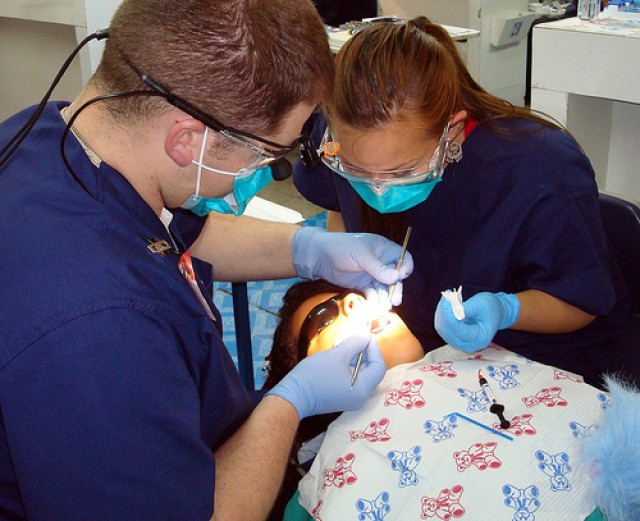
FORT SILL, Okla.--When Carlos was 8-years-old, he chipped off half of a front permanent tooth in an accident. The broken tooth made him look like Lloyd Christmas Jim Carey's limo driver character in the movie "Dumb and Dumber." His classmates would often tease him about his tooth.
Carlos, who is now 10 and lives in an impoverished area of Tegucigalpa, Honduras, had his tooth restored by a Fort Sill dentist, who was part of a U.S. military humanitarian mission there.
"He was just so amazed and so happy he kept looking at himself in the mirror," said Dr. (Capt.) Ryan Swiss, who performed the procedure.
Later when Swiss and a dental team visited Carlos' school for a ceremony, Carlos ran up to Swiss, hugged him, high-fived him and told all his friends: "Hey, that's the guy who fixed my tooth."
Carlos was one of about 220 children, who received dental care by a team of six U.S. military dentists April 17 through 30 in Tegucigalpa, the capital. The team performed more than 2,000 procedures during the two weeks. On the team were four Fort Sill dental officers, who are residents in a one-year advanced dentistry program.
The Fort Sill dentists flew out of Lawton April 17 on commercial air to Dallas then on to Houston, where they boarded another commercial flight for the final three-hour leg to Tegucigalpa.
The mission was to provide pediatric dental care to deprived children from two schools. A pediatric dental officer from Fort Benning, Ga., and a permanent-duty Air Force dentist assigned to Honduras, were also on the team. The team was complemented with enlisted dental technician Soldiers, who all spoke Spanish.
The dentistry was performed at a private dental school that was closed for summer break. The team brought all their own equipment, such as drills, anesthesia, gauze, suction tips basically everything used in a dental room.
Each day at 7:30 a.m. the dentists were driven from their hotel under armed guard by Honduran national police to the clinic, Swiss said. It was a 20- to 30-minute drive depending on traffic through city streets.
At the clinic, four or five dentists would see about 12 children in the morning. Before the children saw their dentists, they were given lessons in brushing and flossing by the dental techs, who used puppets as teaching aids. The techs also served as translators between the children and those dentists who didn't speak Spanish.
The dentists faced special challenges because they were seeing the patients only once so all the care had to be performed on that visit and the indigent children had not received much previous dental care or dental education.
"We were trying to do as much good as we can with the little time we had with them," Swiss said. "The time constraint was a little bit of a difficulty and we lost power a couple times."
Most work was completed in 45 minutes to one hour, but some children were in the dental chair for two hours, said Dr. (Capt.) Dinh Nguyen, who graduated from New York University dental school last June.
"We divide the mouth into four quadrants and focus on each quadrant and what we can do to save the teeth," Nguyen said. In cases, where the decay was so bad in non-permanent teeth, the tooth was removed to prevent infection, he said.
In one extreme case, a boy, 11, told his dentist that he had never brushed because he said no one ever taught him how , said Dr. (Capt.) Troy Lundell.
"Most of the kids had seen a toothbrush before, but there was a lot of decay, a lot of bombed out teeth," Lundell said. "It was pretty sad."
The dentists performed their work wearing scrubs, but one day wore ACUs when the local media came out to do a story on them. When enjoying the local countryside on R and R, the Soldiers were instructed not to disclose their health care mission, Swiss said.
Some of the dental students and assistants from the dental school came off their breaks to observe and talk to the Army dentists to see how they did things, Swiss said.
The dentists repeated their routines in the afternoons and would get back to the hotel between 5 and 6:30 p.m. depending on patient load and clean ups.
Lundell said he found the experience of working in such a poor country to be very humbling.
"Hopefully, it gave the children a better understanding and better values of dental health," he said.
Swiss said the mission gave him a greater appreciation of health education and health care in America.
"We have it very good here," he said.
At the end of the health care mission, the staff of the two public schools invited the dentists and techs to a farewell ceremony.
"They were very grateful and wanted to let us know how thankful they were," Lundell said, "and to let the kids know how important and special this was."

Social Sharing